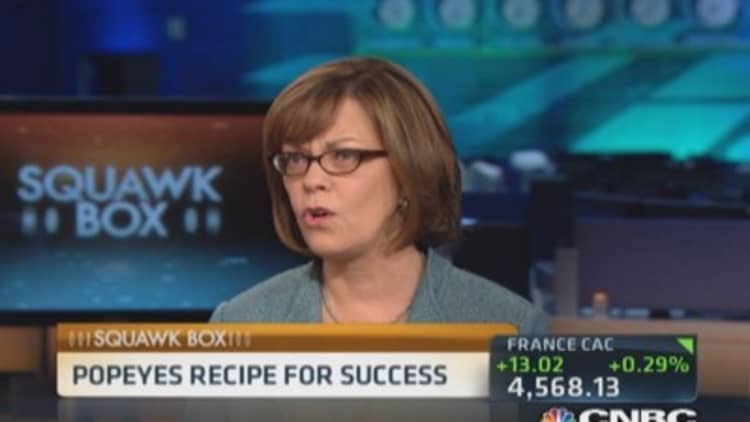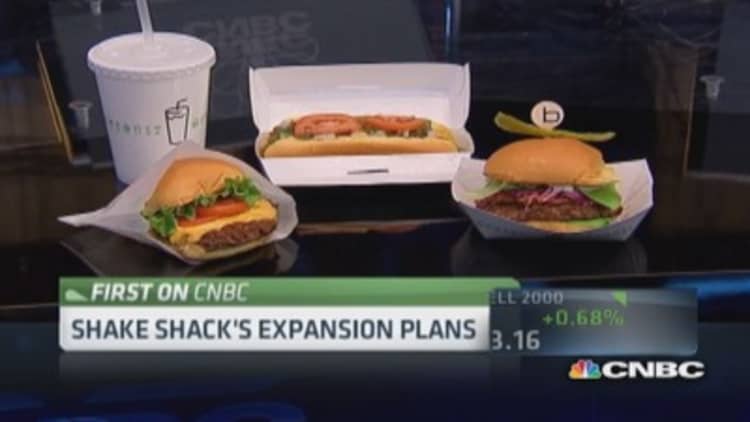It is one of the hard truths of New York real estate: Restaurants help revitalize neighborhoods, then are forced to close when their rents skyrocket.
The latest casualty is Union Square Cafe, a pioneering restaurant that became the mother ship of the fleet run by the entrepreneur Danny Meyer. It will forfeit its lease at the end of next year, close its doors and move to a location to be determined. The East 16th Street space it has occupied for nearly 30 years will go on the market this week, brokers said.
Manhattan restaurateurs often lament that they face impossible odds in a real estate climate that increasingly puts them in competition for space with international retail chains, banks, pharmacies and other deep-pocketed businesses. If Mr. Meyer, a mogul with acclaimed and successful restaurants all over the world, can be compelled to close Union Square Cafe, they ask, what hope is there for the rest of them?
"There's no such thing as a New York restaurant that is immune to real estate," Mr. Meyer said in an interview.
Just as farmers are always complaining about the weather, restaurateurs complain about the rent. But with a recent spate of closings and a continuing rise in rents in downtown Manhattan, where bargains could once be had, even well-established restaurateurs are in a state of agitation.
WD-50, an international destination on the Lower East Side led by the chef Wylie Dufresne, announced two weeks ago that it would have to close and relocate because its 50 Clinton Street quarters will be razed to make way for an apartment building. Hearth, one of the first restaurants to bring artisanal cooking to the East Village, was just hit with a 65 percent rent increase, and the chef and owner, Marco Canora, said his entire business model may have to change.
"I'm trying to be a smart businessman," Mr. Canora said. "But I can't do that at the cost of turning my back on my entire belief system and serving commodity pork and Perdue chicken."
Many of these restaurants — like Florent in the meatpacking district and Chanterelle in TriBeCa, both shuttered in recent years — opened in decaying neighborhoods, providing a wedge for gentrification. Now they say they can no longer afford to operate in the places they helped transform.
"Eventually, they're going to drive away all the people and places that make New York City interesting," said Bobby Flay, who last year closed Mesa Grill, the Flatiron district restaurant that put him on the national map, when the rent doubled. A Midtown landlord offered him a prime location near Rockefeller Center, but ultimately leased the space to a TD Bank branch.
"What brings ghost towns to life? Restaurants," said Mr. Flay, who opened Mesa Grill when lower Fifth Avenue was a windswept boulevard of abandoned garment businesses. "We blaze the trail, we do the hard work, and then we're out."

Although Union Square Cafe has culinary landmark status — it introduced a casual tone to fine dining, brought a new emphasis to warm service and broke ground by buying produce directly from farmers at the fledgling Greenmarket a half-block away — it will leave the spot where it became a neighborhood fixture, drawing regulars who came to count on everything from its bar nuts to its tuna burger, both unchanged since 1987.
Mr. Meyer cited an unbridgeable gap between what the landlord, Ari Ellis of David Ellis RE, believes he can get for the space, and what the restaurant can afford to spend on rent and renovations in order to maintain its high standards of cuisine and service. Both parties said the renegotiations of the 15-year lease, which began in early 2013, had been amicable but fruitless.
"It's better for them as a restaurant business if they go elsewhere, and it's better for us as a real estate business if they go elsewhere," Mr. Ellis said. "There are landlords out there willing to do back flips to get a Danny Meyer restaurant."
More from The New York Times:
Methodist Panel Reinstates Defrocked Pastor
Pediatrics Group to Recommend Reading Aloud to Children From Birth
Don't Turn Up Your Nose at the City in Summer
In other words, the real estate market in Union Square — once a squalid haven for drug users that is now home of the city's largest farmers' market and a thriving food, culture and retail ecosystem — has become so profitable that the kind of sweetheart deals available there in 1985 have become untenable. When Mr. Meyer opened his doors that year, taking over the lease and kitchen from a vegetarian restaurant, the rent was $8 per square foot, for a total of about $48,000 a year.
Today, as the neighborhood has become home to international chain stores like Zara, Gap and Anthropologie, brokers at Robert K. Futterman say they plan to ask $650,000 a year for the lease. City restaurateurs say that a workable formula for rent is about 5 to 10 percent of gross revenue, much more than in other American cities, and that market rents are beginning to exceed that.
Read More
John Daley, the chef and owner of New York Sushi Ko, on the Lower East Side, said his tiny restaurant turned a profit only because he was its sole kitchen employee and its food commanded relatively high prices, about $150 a person. "In a small space, you can make money by serving a few people expensive food, or serving hundreds of people tacos or Cuban sandwiches," Mr. Daley said. "It's the middle places that are losing ground."
In his neighborhood alone, once-popular spots like Family Recipe, Inoteca and Sorella have closed in the last three months.

Mr. Meyer, who also runs Gramercy Tavern, the Modern and the forthcoming cafe in the National September 11 Memorial Museum, said Union Square Cafe would reopen, but not necessarily in or near Union Square.
In recent years, his Union Square Hospitality Group has focused expansion not on fine dining, but on its profitable Shake Shack burger chain: the 48th store opened Monday in Washington, D.C. In 2010, the company closed its high-end Indian restaurant Tabla; in 2011 it sold the prestigious Eleven Madison Park to its chef and general manager; and in 2012, the company sold a 39.5 percent stake to an investment bank, which helped fuel growth for Shake Shack, now serving in London, Dubai and Kuwait City.
Each of the group's restaurants is a separate company, Mr. Meyer said, meaning that revenue from Shake Shack cannot be repurposed to pay for ingredients or salaries at Union Square Cafe. "My people can't thrive if the individual restaurant doesn't work financially," he said.
Read More Boom helps fast-food workers bring home the Bakken
The cafe, a leader in offering living wages and benefits to restaurant employees, has 13 who have worked there for more than 20 years; many others have passed the decade mark. This suggests labor costs that ordinary restaurants cannot begin to contemplate. It also suggests that Mr. Meyer may move to one of the many places — hotels, residential developments and malls — that build kitchens and offer favorable rents to prestigious restaurants that draw customers. Per Se and Masa took advantage of this mutually beneficial model to open in the Time Warner Center.
Why can't Mr. Meyer himself, whose own fortune is considerable — and may have increased last week when Priceline.com bought OpenTable, where Mr. Meyer sits on the board and is a shareholder — simply bail out the restaurant and keep it in its ancestral home?
Mr. Meyer, who declined to disclose his net worth, said he "would do it in a heartbeat" if it made financial sense. But, Mr. Meyer said, with antiquated floors and venting systems and kitchen appliances, plus limited space for kitchen expansion, it would be like a residential tenant doing a million-dollar renovation in a rented studio apartment.
Mr. Ellis, who grew up in the neighborhood and whose father was Mr. Meyer's original landlord, said the closing of Union Square Cafe would be painful for him, for the area and for Mr. Meyer, but a small, independent fine-dining restaurant could no longer operate in one of New York's busiest crossroads. Still, he said, he could still envision a partnership with Mr. Meyer's restaurant group.
"A Shake Shack could do very well in that space," he said.
— By Julia Moskin from The New York Times

